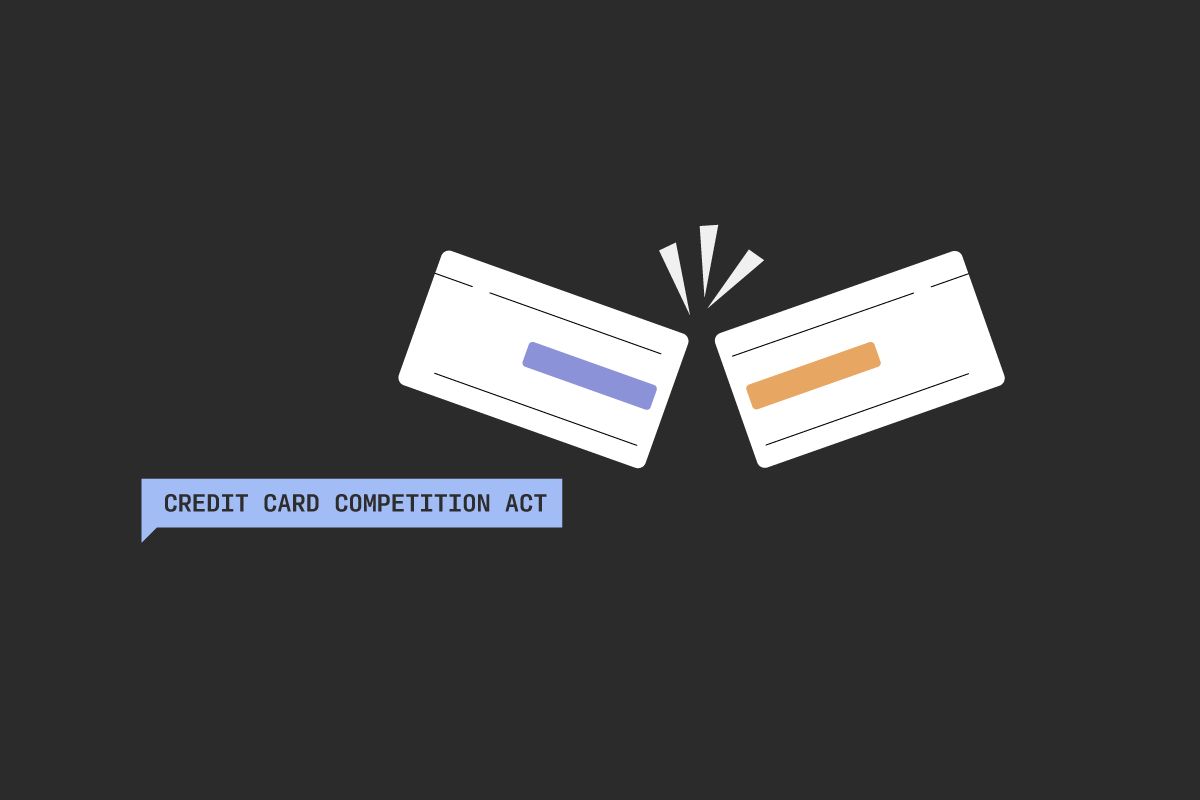Blog
The Credit Card Competition Act has been reintroduced. Are merchants going to benefit?
June 9, 2023
Editorial Team

On Wednesday, June 7, a bipartisan group of legislators reintroduced the Credit Card Competition Act. Following last year’s (abandoned) proposal of the same name, this year’s initiative includes support from a wider range of bipartisan legislators from both the Senate and Congress.
The proposed legislation aims to inject more competition into the credit card industry and lower merchants’ payment processing fees. Specifically, it aims to amend the Electronic Fund Transfer Act by directing the Federal Reserve to require credit card issuing banks to offer a minimum of two networks for merchants to process payments.
What’s to like about the proposed legislation
The requirement of two networks comes with an important caveat; the legislation would prohibit these two networks from being Visa and Mastercard.
Rather, banks would be mandated to enable card payments to be routed over at least one network that competes with these two giants — in theory ensuring a greater competition among the networks, which would translate into lower fees.
This intent is one that almost everyone would agree on, except the card networks which are making enormous profits from their interchange fees, and other players in the value chain that collect a percentage of the transaction processing fees. Indeed, the press release notes:
Visa’s and Mastercard’s market power and network structure have enabled them to impose fees on U.S. merchants that are among the world’s highest, charging a total of $93 billion in U.S. merchant credit card fees in 2022.
In an ideal world, competition and innovation would ensure that payment transaction fees were fair, transparent, and reasonable. But since that is not happening, and caps on interchange fees in many other parts of the world have been effective in lowering payment processing costs for merchants, this appears to be a welcome development.
The major lobbying efforts that can kneecap the legislation
However, there are several obstacles to any meaningful legislation being passed, a key one of which is lobbying by the card networks and banks.
This is something the card networks have long engaged in. In fact, some of the actions they have taken over the last few years include antitrust lobbying, defending against class-action lawsuits from small businesses accusing the card companies of conspiring with banks to increase transaction fees, proposing to cap surcharges that stressed merchants have been passing on to customers to recoup some of their burdensome processing fees, and many more.
And the card networks are already involved in “particularly intensive” lobbying efforts to kneecap the current proposed legislation.
Here is what merchants can do instead
But merchants do already have other options. Specifically, payment methods such as Link Money - Pay by Bank offer a significantly cheaper alternative to card payments, with an equal or even better customer experience, and even stronger fraud protection than credit cards. This is achieved in the following ways:
1. Leveraging the ACH network
Payments made with Link Money - Pay by bank run over the ACH network, circumventing the need to use credit card rails and therefore avoiding their exorbitant costs. This makes pay by bank drastically cheaper than costly credit card payments — an average of 70% lower.
2. A seamless checkout experience
With pay by bank, the customer selects the pay by bank option on the checkout screen, chooses their bank, and is redirected to their bank app or website, where they authenticate the payment the same way they normally log in to their bank account. This is highly intuitive and easy for customers — on a par with or even better than card or wallet payments, since no card details need to be entered.
3. Lower fraud
Since bank authentication tends to be strong, the risk of fraud is lower when compared to credit cards. And ACH payments have the lowest fraud rates in the online payments world.
Cut your processing fees by 70% immediately
Credit cards have been the default way to pay in the US for decades. And even though newer methods such as wallets and BNPL have emerged recently, in many cases they are still running on card networks and/or have similarly high processing fees, with the only tangible benefit being a slicker user experience, and — in the case of BNPL — higher average order values for merchants.
But pay by bank is not just a shiny new interface. It is a new approach to payments that combines the best UX, the most cost-effective, secure rails, API and SDKs with a laser focus on making things clear and easy for the merchant, and the ability to reach 90%+ of the banked population (and growing) in the US.
To find out more about pay by bank, contact us.